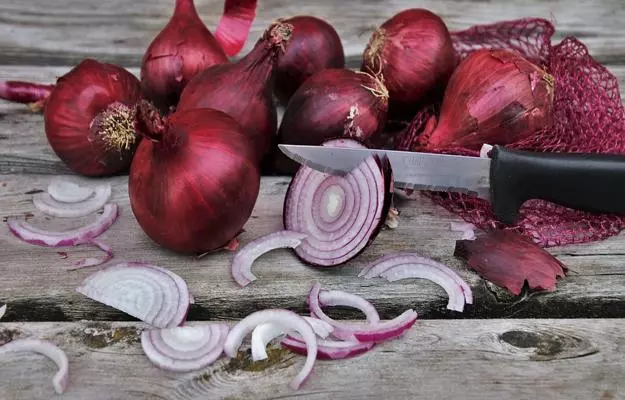The scientific name of onion is Allium cepa. Onion is one of the vegetables that is cultivated the most in the Allium region. It is known by many names in India - Pyajor Kanda or Dungri in Hindi, Ulipayalu / Yera Gaddalu in Telugu, Vangayam in Tamil, Savana in Malayalam, Uligadde / Eruli / Neeruli in Kannada, Pyajaj / Piyaj in Bengali, Dungri Kanda in Gujarati and Kanda in Marathi. The onion plant has blue-green colored leaves. Onions contain many antioxidant compounds that are very effective in neutralizing the free radicals present in the human body. Onion has been used by humans for medicinal purposes for many centuries. Onion has been one of the staple diets of humans for more than 7,000 years. Onion is one of the most grown and cultivated plants globally. Throughout history, onions were used in worship in some cultures such as Egypt etc.
Onions are known for their therapeutic benefits since ancient times. Even the World Health Organization has confirmed that onions are beneficial for people with poor appetite and those suffering from atherosclerosis. Health experts accept the fact that onions are a great cure for patients with chronic asthma, allergic bronchitis, cough related to common cold and cough syndrome.
Onions have many valuable medicinal properties as they contain many nutrients, vitamins, minerals and organic compounds. Apart from containing minerals like calcium, magnesium, sodium, potassium, selenium and phosphorus, it is also a good source of vitamin C, vitamin B6 and fiber.
Read More - (Health benefits and side effects of beverages)
-
Benefits Of Onions
- Benefits Of Onions To Avoid Insect Bites
- Benefits of onions for urinary tract infection
- Benefits Of Onions To Relieve Stomach Upset
- Benefits Of Onion For Treatment Of Anemia
- Benefits Of Onion To Increase Sex Drive
- Benefits Of Onion To Relieve Cough
- Benefits Of Onion For Hair
- Benefits Of Onion For Skin
- Benefits Of Onion For Earache
- Benefits Of Onion For Cancer Treatment
- Benefits Of Onion To Control Sugar
- Benefits Of Onion To Keep The Heart Healthy
- Benefits Of Onion For Immune System
- Benefits Of Onion For Oral Health
- Other Benefits Of Onion
- Side Effects Of Onions
- Right Way To Eat Onion
- Summary
Benefits Of Onions
Onion is one of such adaptogenic plants which is a great source of maximum essential nutrients for our body's needs. So let's know about the most valuable and well-known health benefits of onions -
Benefits Of Onions To Avoid Insect Bites
You can use onion juice to reduce the pain caused by bee stings. Along with this, fresh onion juice or paste can also be used externally on scorpion stings and other insect bites. The smell of onion also helps in repelling insects.
Benefits of onions for urinary tract infection
For people suffering from a burning sensation during urination, onions can provide great relief. People suffering from this condition should drink boiled water with 6 to 7 grams of onions.
(Read more - Top Benefits of Nirgundi)
Benefits Of Onions To Relieve Stomach Upset
Onions are rich in fiber, which acts as a natural laxative and makes it easier to pass stool. Fiber helps cleanse the intestines and remove waste from the body. Saponins are also found in onions which help relieve stomach pain and cramps. Onions have anti-inflammatory and antibacterial properties that relieve stomach upset and related gastric syndrome. Apart from this, it is very good to consume raw onion in case of constipation. The fiber present in onion removes the food stuck inside the stomach, which clears the stomach.
(Read more - Benefits of Kachur)
Benefits Of Onion For Treatment Of Anemia
Iron deficiency causes a disease like anemia which can sometimes take a fatal form. Onion can be very helpful in the treatment of anemia because about 0.2 grams of iron and folate is found in 100 grams of onion. Folate is a phytochemical that helps in absorbing iron to its full potential. Eating onion with jaggery and water is very beneficial for the treatment of anemia. Because it helps in the production of red blood cells by increasing minerals like iron in the body. Therefore, the symptoms of anemia can be prevented by consuming onions in the proper quantity in your diet.
(Read more - Health Benefits of Kantola)
Benefits Of Onion To Increase Sex Drive
Onion is known to increase the desire for a healthy sex life. Take a tablespoon of onion juice with a teaspoon of ginger juice three times a day. It can increase libido and sex drive. Onion is one of the medicinal drugs used for impotence in western Uganda. Onions are considered beneficial for men. Taking onion juice with honey can also help in increasing fertility in men.
(Read more - Benefits of Biotin for Skin Health)
Benefits Of Onion To Relieve Cough
Mix onion juice and honey in equal amounts. Consuming this mixture can relieve the symptoms of sore throat and cough.
Benefits Of Onion For Hair
Use onion juice on hair or scalp to get rid of lice and hair loss. This is the most prominent benefit of onions for hair. Apply onion juice to the hair and massage with fingers – then wash your hair thoroughly after a while – this will reduce your hair fall. It will also remove dandruff and maintain the natural color of the hair. It also acts as a natural conditioner. Applying onion juice to the hair makes the hair thick. It also helps in growing your hair faster. In a study, participants washed their hair with onion juice for several days and in this study it was observed that their hair grew thicker and faster than other people.
(Read more - Benefits of Khesari Pulse)
Benefits Of Onion For Skin
Onion contains vitamin A, vitamin C, and vitamin E. All these vitamins are very beneficial for the health of our skin. All these vitamins prevent the process of skin aging due to free radicals. Onion is also a powerful antiseptic, so it also protects the skin from bacteria. Vitamin C is found in onions. You may not know, but the consumption of vitamin C helps in improving the skin. A mixture of onion juice with honey or olive oil is considered the best treatment for the treatment of acne. Onion is one of the vegetables that reduces inflammation. Therefore, the active compounds present in onions can also help in reducing redness and inflammation caused by acne.
(Read more - Benefits of Sea Salt)
Benefits Of Onion For Earache
A few drops of onion juice can actually prove to be very beneficial for persons suffering from earache. For this, onion juice can be used to remove the tingling in the ear through a piece of cotton. This remedy provides relief from earache. According to a report, most people use onions for ear diseases. They believe that putting onion juice in the ear provides relief from pain. For this, heat the onion, extract its juice and then put a few drops of that juice in the ear.
(Read more - Kombucha Tea: Health Benefits)
Benefits Of Onion For Cancer Treatment
Onions are rich in many types of compounds that successfully prevent the growth and spread of cancer cells. Quercetin is a very powerful antioxidant compound that is known to prevent the spread of cancer. Onions contain a significant amount of quercetin. Vitamin C is also a strong antioxidant that can reduce the presence and effect of free radicals in the body. Free radicals are chemical byproducts of cellular metabolism and they can transform cancer cells into healthy cells. Therefore, any foods rich in antioxidants are beneficial for everyone. Because every person is susceptible to this internal attack due to oxidative stress. Therefore, foods rich in antioxidants neutralize these free radicals.
(Read more - Benefits of Soaked Black Gram)
Benefits Of Onion To Control Sugar
Diabetes is a disease that can happen to any person at any time. If you eat junk food and are living a sedentary lifestyle, then you may be at a higher risk of getting diabetes. Onions contain chromium (chromium is not found in most vegetables that we use on a daily basis). Chromium helps control blood sugar levels in the body and slowly releases glucose to our muscles and body cells. The biggest problem in diabetes is maintaining a safe blood sugar level. Therefore, eating onions can help control your blood sugar levels, which is important for diabetics. Eating raw onions is recommended to maintain blood sugar.
(Read more - Benefits of Drinking Hibiscus Tea)
Benefits Of Onion To Keep The Heart Healthy
Onion contains quercetin which has the ability to fight heart disease. It provides both antioxidant and anti-inflammatory properties that help keep the heart healthy. It is an important part of French cuisine and the residents there believe that onions reduce the risk of heart diseases. Onion works to prevent blood from clotting in the body, so onion is also called a blood thinner. It prevents red blood cells from gathering and clotting in one place, due to which arteries can get blocked. Heart disorder or heart disease can occur due to blocked arteries and blood clots. Along with this, if onions are used daily, then onion can also help in reducing or completely eliminating cholesterol (which causes heart problems).
(Read more -Health Benefits of Putrajeevak)
Benefits Of Onion For Immune System
Onion contains a lot of phytochemicals which work to increase vitamin C inside the body. The defense mechanism of our body is our immune system and a healthy immune system protects us from diseases caused by bacterial, fungal and viral infections. When you consume onions, the amount of vitamin C in your body increases due to which your immune system becomes stronger. Because vitamin C protects your immune system from toxins and various types of external harmful elements. These toxins and external harmful elements can cause disease. Onion helps in building a strong immunity.
(Read more -Health Benefits of Chamomile)
Benefits Of Onion For Oral Health
Onions contain thiosulfinates and thiosulfonates that help reduce bacteria that can cause tooth decay. It is best to eat onions raw because some of the beneficial compounds present in them are destroyed after cooking. Onions contain vitamin C which helps keep teeth healthy. It is also believed that onions relieve toothache. However, not much research has been done on this till now. Onions are often used to prevent tooth decay and oral infections. Chewing raw onions for 2 to 3 minutes can potentially destroy germs present in the mouth area as well as the throat and areas around the lips.
(Read more - Benefits of Buttermilk for Your Health)
Other Benefits Of Onion
- A small piece of onion can work against the side effects of fever if you place it on the forehead.
- A small piece of onion can stop or slow down breathing, bleeding through the nose.
- An onion can treat insomnia or sleeping disorders. It will definitely give you a good sleep.
- Onions can improve the digestive system. If you have any digestive problem, onion can cure it by increasing digestive juices.
- Inflammation caused by arthritis in the joints can be cured with onions.
- There is a small trick with onions to get some relief from body pain. Onions can be fried in sesame or castor oil and used to cure any pain.
- Black onion seeds contain an antioxidant called thymoquinone. It is known to deal with neurotoxic effects. Thymoquinone protects the brain from damage caused by lead poisoning. In turn, black onion seeds help prevent brain damage caused by lead.
(Read more - Benefits of Wheat Bran)
Side Effects Of Onions
- Onion reduces sugar levels, so diabetics should check their sugar before consuming it as it can reduce their sugar levels drastically.
- Although onions are used in the treatment of many gastrointestinal disorders, its excessive consumption can cause gastric irritation, vomiting, nausea. If you experience any such conditions from the use of onion regularly, you are advised to contact a doctor. Applying onion juice on the skin may cause irritation and rashes on the face or skin. Hence it is advisable to test it on a small area of your skin before applying it on your skin. It also helps in reducing joint pain and inflammation of conditions like arthritis. Pregnant and nursing women should limit the consumption of onion as it often causes irritation during these stages.
- Uncontrolled consumption of onions can cause irritation. Thus, it can cause adverse effects to people with heart diseases, in such a situation quick medical attention is required.
- Consumption of onion too often due to its strong aroma can be attributed to its high content of sulfur.
- Onions can lower systolic and diastolic blood pressure. Thus, those who take medicines for blood pressure should be cautious while consuming it.
- People who are allergic to onion should not take aspirin and onion as it increases the sensitivity to onion.
- It is advisable to consult a doctor before taking any lithium medicines while consuming onion.
Right Way To Eat Onion
- You can eat onion without cooking it.
- Onion is also used in soup.
- Onion can also be eaten as a salad.
- Onion is used to make vegetables more delicious.
- Onion is used to make pickles.
- Onion is also used in making pulao, it adds a very good taste to the pulao.
- Onion pakodas are also made and eaten.
- Onion is used to make any type of chutney delicious.
Summary
Onions provide many benefits for health. It is rich in antioxidant and anti-inflammatory properties, which help in boosting immunity, keeping the heart healthy and protecting from infection. Consumption of onion improves digestion and the quercetin present in it is helpful in controlling blood pressure and cholesterol. Onion is also beneficial for skin and hair. However, for some people, excessive consumption of onion can cause stomach gas, bad breath or acidity. Therefore, it is important to consume it in balanced quantities.
Medicines / Products that contain Onion
- Vanalaya Onion Hair Oil - ₹500
- Herbal Canada Onion Oil 50ML - ₹80
- Cipzer Rogan Beer Bahuti 20 ml - ₹449
- Cipzer Majoon-E-Piyaz 125 gm - ₹449
- Cipzer Itrifal Muqil 125 gm - ₹449
- Cipzer Cobra Tila 10 ml - ₹2789
- Lactare Capsule (30) - ₹282
- Mederma Scar Gel 10gm - ₹479
- Ayouthveda Anti Hairfall Tonic Complete Care Kit - ₹1049
- Mamaearth Onion Shampoo 400ml - ₹409
- Mamaearth Onion Shampoo 250ml - ₹299
- Ayouthveda Anti Hairfall Shampoo 200ml - ₹419
- Mamaearth Onion Hair Oil with Redensyl 150ml - ₹419
- Mamaearth Onion Hair Serum For Silky & Smooth Hair 100ml - ₹299
- Cipzer Sharbat Faulad 200 ml - ₹449
- Biomedison O2H Onion Oil for Hair - ₹334
- Herbal Canada Onion Oil 200ML - ₹276
- Herbal Canada Onion Oil 100ML - ₹153
- HairFul Red Onion Hair Oil - ₹240
- Vanalaya Onion Hair Shampoo - ₹400
- Cipzer Labub-E - Saghir 125 gm - ₹449
- Cipzer Mojo Max Capsule (7) - ₹899
- Riddhish Herbals Onion Oil 120ml - ₹299
- Zenius Onion Hair Oil for Hair Fall Control 200ml - ₹549
- Glamyo HerbGro Hair Shampoo 200ml - ₹299
- Ayouthveda Protien Hair Oil 100ml - ₹315
- Cipzer Majoon-E-Punbadana 125 gm - ₹449
- Mamaearth Onion Hair Oil with Redensyl 250ml - ₹599
- Mamaearth Onion Hair Mask - ₹509
- Mamaearth Onion Conditioner 400ml - ₹499
- Mamaearth Onion Conditioner 250ml - ₹300
- Glamyo HerbGro Hair Oil 200ml - ₹299
- 1 Month Haircare Glamyo HerbGro Hair Shampoo Glamyo Hair Conditioner Glamyo Hair Serum Glamyo Hair Oil - ₹1099
- Tantraxx Monovit Red Onion Shampoo For Silker And Stronger Hair 100ml - ₹399
- Shri Chyawan Ayurveda Onion Hair Oil 100ml - ₹249
- Shri Chyawan Ayurveda Onion Hair Oil Pack Of 2 - ₹449
- Shri Chyawan Ayurveda Onion Shampoo 100ml - ₹149
- Shri Chyawan Ayurveda Onion Shampoo Pack of 2 - ₹299
- Vigini Natural Actives Erase Stretch Marks Removal Cream - ₹349
- Vigini Natural Actives Damage Control & Nourishing Hair Oil - ₹229
- Mederma Scar Gel 20gm - ₹577
- Aveda Ayur Onion Bhringraj Enriched Hair Growth Oil - ₹243
- Aadar Good Herbs Hair Oil 100 ml - ₹430
- Charak Neo Tablet - ₹116
- Vaidyaratnam Murivenna - ₹140
- Hamdard Hamdogen Capsule - ₹261
- Lactare Cardamom Granules 250gm - ₹206
- Lactare Cardamom Granules 200gm - ₹192
- Merlion Naturals Onion Hair Oil 200ml - ₹559
- Oliveglow Folliwin Capsules - ₹1079








































